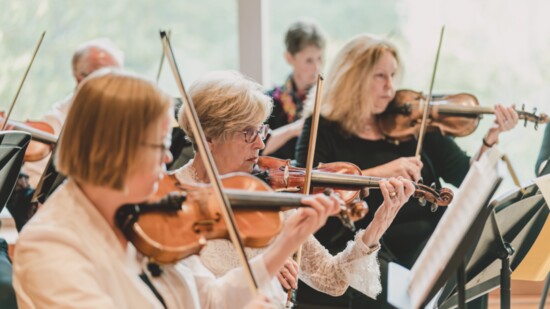As adults, it can be intimidating to learn a new skill, especially an artistic one. What if we fail, what if we’re not good enough?
“Adults often have a set idea of their limitations,” says Andrea Leap, an instructor with MacPhail Center for Music in Minneapolis. “Many people are afraid to start a new activity; it just feels so daunting.”
Most of us are also very busy, so we often put off taking time out for ourselves. “I would urge you not to wait for the perfect time to start something new, because there won't be one, and it may end up being something that can really add so much value and richness to your life,” says Andrea. “Or, if you find out it’s not for you, then at least you tried.”
As a singing instructor with MacPhail and other institutions for almost 20 years, Andrea has seen how learning can change people’s lives. “They realize that doors are not closed that they thought were closed. It's also really fun to see people grow in personal ways too. I watch them become more generous with one another when they're working together and gaining confidence. I also love watching the courage of people doing something new and appreciating the courage of others doing it. Is there anything more beautiful?”
There are many cognitive benefits of studying and learning something new, especially when it comes to music. “Studies show that music strengthens and develops memory, and memory pathways,” she says. “Its rhythmic piece, its melodic piece, the text piece, and the instrument piece – it sort of splits into all those things so that your brain can process it and then it all comes back together and arrives at the destination. What that means for people who are concerned about cognitive decline and memory, is that it essentially provides your brain with a detour, another route to remembering.”
There are also physical benefits, says Andrea. Listening to music manages and alters your hormonal releases, increasing dopamine, which helps manage reflexes, and decreasing cortisol, which in turn helps regulate blood pressure and heart rate. Oxytocin and serotonin, those other feel-good hormones, also get released. If you're participating in music, say singing in a choir or playing an instrument, these effects are even more substantial.
“There is also a regulatory nerve in your spinal column that manages things like digestion, and when it gets out of whack, lots of things go wrong,” says Andrea. “You may have problems with diabetes, epilepsy, depression – you name it. But, if you can get that nerve to vibrate, that helps regulate these conditions.”
Listening to music is a passive way of getting that nerve to vibrate, she explains, but singing really gets it to vibrate because our vocal cords are right next to it. “It's an enjoyable way to improve your health and overall quality of life.”
There is also an element of socialization and cooperation when you sing or play music because most people aspire to do it with or for others. “It provides a point of connection and self-expression and that element of humanity,” says Andrea. “It breaks down that sense of isolation and people realize that they can do things they couldn't do before.”
Andrea’s oldest student was in her 90s, and she currently teaches a choir whose members on average are aged 80. So, it’s never too late to learn something new.
MacPhail Center for Music, which has been in business for close to 120 years, is one of the top arts organizations in the Twin Cities and the largest community music school in the nation. MacPhail offers a wide variety of classes, including beginning piano for adults, returning to piano for adults and beginning guitar for adults, as well as individual lessons on 35 instruments plus voice.
There are also ensembles, such as The New Horizons Orchestra, for those who are advanced in their playing and would like to perform. Chamber music opportunities place advanced players in a small ensemble where they play with other advanced students in a string quartet, piano trio or flute quartet. They also get coaching from a faculty member.
The important things to ask yourself, Andrea says, are these questions: “What are you looking for in terms of your learning experience? Are you looking for a social experience? Do you feel more comfortable learning in a group or on your own? What are your goals?” For those interested in one-to-one, individual instruction, the placement process at MacPhail matches students with an appropriate teacher based on the answers to these questions.
“If you’re not sure what you want, I encourage you to sign up for a couple of lessons and see how things go,” says Andrea. There are a lot of different ways that you can participate. MacPhail offers music learning opportunities for all ages and abilities. All are welcome.
Every song, every story has a beginning. Visit macphail.org to start your journey today.
